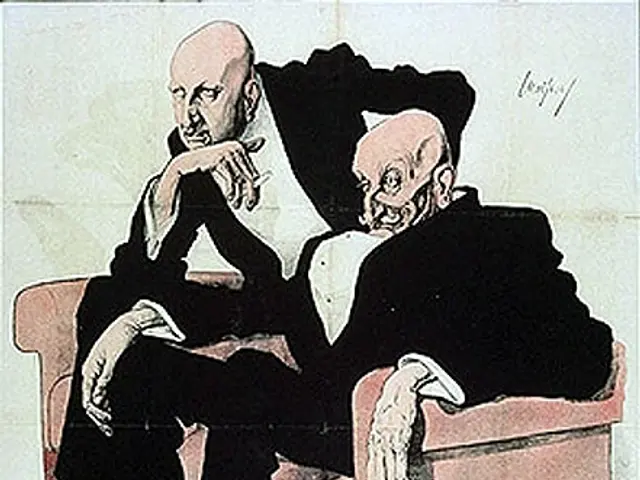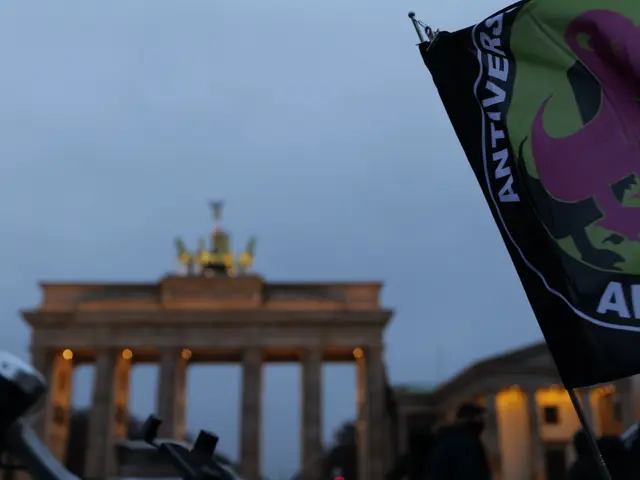Trump Accused of Aiding Boeing Through Coercion
In a series of high-profile trade deals, US President Donald Trump has been instrumental in promoting Boeing, the American aircraft manufacturer. Trump's administration has leveraged trade negotiations to secure significant aircraft purchases from countries such as Indonesia, Qatar, Saudi Arabia, the UK, and Japan[1][2][3]. These deals, often quick ways to shift trade statistics due to their high dollar value, have provided a significant marketing advantage for Boeing.
Trump's personal endorsement and involvement in these deals have been seen as a powerful tool for Boeing. The company's inclusion in major trade agreements highlights its strategic importance as a key U.S. exporter[2]. The visibility from these high-profile deals boosts Boeing's stock and bolsters its public image, attracting more customers and investors who perceive the company as a winner in global trade dynamics[2].
However, the success of these announced Boeing purchases depends on various factors. Strong political connections and diplomatic efforts can significantly influence the success of these deals, with Trump's personal involvement being a key component[1][2]. Economic conditions in the purchasing countries, including their ability to finance large purchases, can impact the conversion of intentions into firm orders[3]. Regulatory frameworks, such as tariff reductions and other changes facilitated by trade agreements, can make Boeing's aircraft more attractive to buyers. Conversely, changes in trade policies or tariffs can deter purchases[3][5].
Boeing must also compete with other aircraft manufacturers like Airbus. The terms of these deals, including pricing and delivery schedules, can impact Boeing's competitiveness[2]. Operational and technical factors, such as performance, safety, and maintenance costs, are crucial in securing purchase agreements[2].
Unfortunately, the aviation industry has been heavily impacted by the corona pandemic, causing a significant slowdown in Boeing's production. The crash of an Air India Dreamliner in June resulted in the loss of 260 lives, raising concerns about the safety of these aircraft[9]. In response, the US aviation authority has repeatedly recommended checking the fuel switches on some Boeing models, following a warning about potential security gaps in 2018[10].
Despite these challenges, the US and UK agreed to a trade deal worth $10 billion, part of which includes Boeing aircraft[4]. Trump secured 160 jets for the state-owned Qatar Airways during his visit to Qatar, with options for another 50[6]. However, China has refused to accept new US aircraft during the trade war[8].
Some experts, such as aviation expert Gerald Wissel, see no reason for Airbus to worry about Trump's Boeing deals[11]. Boeing and Airbus are well-utilized, and new orders are not a great threat to Airbus[12]. However, mass layoffs at the US aviation safety agency could pose a significant safety risk[13].
In conclusion, Trump's involvement has bolstered Boeing's position in the global market, but the success of these deals depends on a combination of political, economic, and technical factors. The aviation industry remains in a state of flux, with safety concerns and economic challenges looming large.
- The employment policy of Trump's administration, as demonstrated by his involvement in Boeing's high-profile trade deals, has become a crucial aspect of the community policy related to the aerospace industry.
- The finance sector plays a vital role in determining the success of Boeing's employment, particularly in light of the economic conditions in purchasing countries, which can impact their ability to finance large aircraft purchases.
- Trump's administration's policy-and-legislation has been instrumental in securing major trade agreements, which have provided Boeing with a significant marketing advantage in the business world, attracting more employment opportunities.
- Despite Boeing's success in securing deals under Trump's administration, the aviation industry, including Boeing and competitors like Airbus, faces challenges in the general-news environment, such as safety concerns and the impact of the corona pandemic on production.








